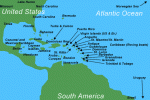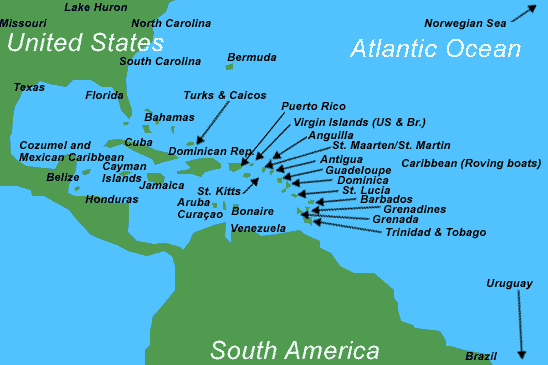 Famous for their beaches, their pleasant climate and a unique cultural heritage, the Caribbean islands are in danger of disappearing due to climate change and the consequent rise in sea level.
Famous for their beaches, their pleasant climate and a unique cultural heritage, the Caribbean islands are in danger of disappearing due to climate change and the consequent rise in sea level.
The recently concluded session of the UN General Assembly was the last scenario where regional leaders called to address this problem, which threatens human survival in the area and other regions of the world.
Several studies warn that rising seas, besides covering some of these islands, could contaminate many sources of freshwater supplies in the Caribbean, which together with the reduced rainfall by climate change will have catastrophic effects.
An October report by the International Program on the State of the Oceans announced that the temperature rise will eliminate summer Arctic ice in 2050.
Meanwhile, the Intergovernmental Panel on Climate Change (IPCC) in its latest report found that global mean sea level rose 19 centimeters since 1901, but in the last decade it grew 3.2 inches, nearly twice the rate during the 20th century. The IPCC predicts that sea levels will rise between 26 and 98 centimeters by 2100, but the National Oceanic and Atmospheric Administration (NOAA) estimated the figure at two meters.
A change in weather patterns is observed, said April Alexander, coordinator for the region of the Global Water Partnership, during a meeting on the subject in St. Lucia.
At the meeting, Cedric Van Meerbeeck, expert of the Caribbean Institute of Meteorology and Hydrology (ICMH), predicted rainfall in much of the area will decrease in the coming years.
According to the ICMH, if in August 2012, Granada and Anguila reported an extremely dry climate, 11 months later the same thing happened with Antigua and Barbuda, Trinidad and Tobago, St. Vincent and the Grenadines, and Barbados.
So far this year Barbados, Trinidad and Tobago and Jamaica decreed at some period rationing water.
Water became a matter of national security for the region, said John Thompson, director of the board of the Caribbean Desalination Association.
The Caribbean Youth Environment Network, an NGO analyzing these issues, highlights that another problem faced by the region is the increase of storms and hurricanes.
It also highlights the negative impact of the destruction of coral reefs in the area and the affectation of salinity, as well as erosion to coastal and agricultural lands.
According to the International Union for Conservation of Nature, coral cover on Caribbean reefs was reduced to 8%, from 50% in 1970 due to overfishing, pollution, coastal development and ocean water warming.
The crisis will have a devastating effect on the economy and society in these islands.
In the Caribbean, beach tourism and commercial fishing economy generate each year billions of dollars. Only in Jamaica reef fishing employs 20 000 people.
Indeed, scientists warn of the intense coastal changes in the region in the coming decades due to erosion, hurricanes and other natural phenomena.
Coastal areas will be severely impacted over the next 50 years, estimated Owen Day, a marine biologist from the CARIBSAVE NGOs.
According to the organization, water level rising could mean for the member of the Caribbean Community (Caricom) the displacement of more than 100 000 people, and the destruction of almost 150 tourists and 20 airports.
It is necessary to raise awareness of the threats the climate change represents to the region, said last July the Minister of Science, Energy and Technology of St. Lucia, James Fletcher.
History teaches us that a single hurricane can destroy years of economic growth from one day to the next, and leave lasting scars, not only in the physical landscape, but also in the national psyche, he said.
The minister noted that in recent years the Alliance of Small Island States maintains a global campaign trying to reduce the concentrations of greenhouse gases and request funds to address these issues.
As part of the regional strategies, the general secretary of the Caribbean Tourism Organization, Hugh Riley, called Caricom members to pass legislation to protect the seas of the area.
Climate change is a sword of Damocles over the small Caribbean islands, threatening to transform the regional geographic landscape and human existence in the area, he warned.
 Escambray ENGLISH EDITION
Escambray ENGLISH EDITION





One comment
Escambray reserves the right to publish comments.